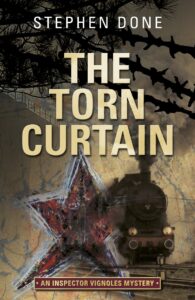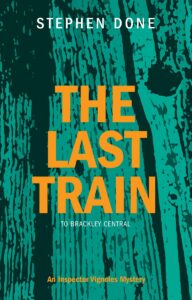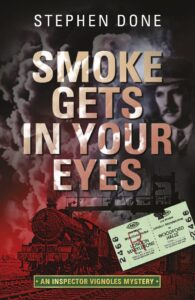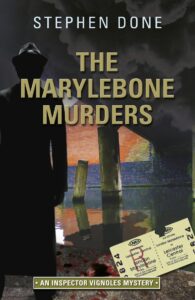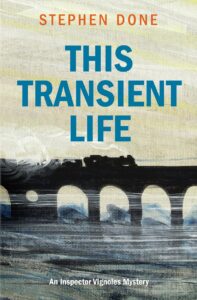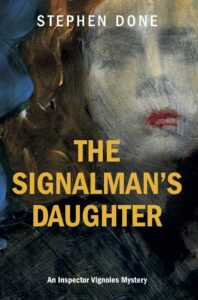Novelist Stephen Done discusses the inspiration for his best-selling Inspector Vignoles railway series, which Ettinger Brothers Productions plan to bring to the TV screen.
“One of the biggest events I experienced as a teenager was watching the massive Brackley Viaduct being spectacularly blown up after the former Great Central Railway was axed under Dr Beeching’s modernisation plan.
This magnificent viaduct was built to last a thousand years, with the result it took three attempts to blow it up and bankrupted the contractor. While spectacular, it was devastating, and I just thought what a waste of such a superb construction. I hated watching this pointless destruction, but like most of the residents of Brackley (the Leicestershire village where I lived), I had to be a witness.
I spent many hours during my teens exploring the abandoned Great Central as its remains gradually disappeared. At least the former Brackley station is now a nice café filled with railwayana, after being reduced to a tyre centre!
While we can’t ever travel again on the GCR’s beautifully engineered high speed trunk line, I realised what I could do was to take people back in time and write about it. I wanted to bring this railway back to life and as I’ve always loved crime fiction this seemed an ideal way.
This idea also related to wanting to come up with something different and a railway detective and a railway setting is very rare in fiction and therefore more interesting.
The Great Central Railway, although long gone, also runs like a thread through my own geographical life story. My mother was born and brought up in Leicester, where Inspector Vignoles has his office. Other family members come from Nottingham and my uncle got his first teaching job in Marylebone.
I took my museum degree in Leicester, a city I love, but nobody writes books about it – or Loughborough! There’s no reason not to and I’ve no idea why it’s been ignored, especially as the neighbouring east Midlands countryside is so beautiful.
A locality will only catch on if someone puts it in the public eye. That’s why the worldwide success of Colin Dexter’s Morse detective novels and tv series has made Oxford the UK murder epicentre.
I’m also intrigued by the post-World War II period. Most people find the Second World War compelling, but I am fascinated by how people coped after years of being shot at and bombed. All of the privations continued. The new Labour Prime Minister Clement Attlee nationalised many industries including the railways and so much changed through the 1950s. That’s why I decided to make the series of books march on year by year, which gives them an energy to go forward to 1968 and the brave new world from which steam power was annihilated.
I also find the social change from 1946 to 1968 extremely compelling. It’s easy to write about it if your parents can tell you or you know yourself. I don’t want to go into cliches, but I’ve tried to find the tiny things that give an insight into these lost times. What perfumes? What cigarettes? What beers? What kind of hat was in fashion in that year? You can find out, but these details are largely forgotten.
Another angle is music, as sound is a very powerful aid to memory. Music can immediately transport you to another time and place. I love the idea of a Bakelite radio playing in a station buffet while passengers sip tea and a steam engine rolls past the window!
The playwright Dennis Potter’s tv series like Pennies from Heaven and The Singing Detective were genuinely a huge influence in me as story and action were powerfully intertwined with music recordings from their period. It’s a step beyond being purely a musical. I loved music from the 1970s and went to concerts by punk bands like Siouxsie and the Banshees, but I also love music from the 1940s.
For the atmosphere of my stories, I sort of aimed at the feel of John Betjeman’s seminal tv documentary Metroland, but with a slightly creepy twist. We’re in sleepy, boring Leicestershire where nothing happens. Or does it? Is there hideous suffering going on somewhere in there? My books Blood & Custard, Cold Steel Rail, and Murder in Broadway forced me into darker territory.
What I won’t do is to be very graphic in my descriptions about how someone is hideously mutilated. I just don’t believe that this is necessary. Murder is an excuse to animate characters in stressful situations and examine their responses, not celebrating death with blood and gore.
In Richard Attenborough’s film 10 Rillington Place about the Christie murders you don’t see the gory details and it’s very low on-screen blood, but it’s compelling and the fact it’s all in your mind makes it one of the most gruesome films to watch. Of course, I stick to the murder mystery tradition that order is restored by the end of the book. Real life can be messy, but this is entertainment.
I see my hero, DI Charles Vignoles as a younger version of John Le Mesurier, the esteemed character actor and a star of Dad’s Army. Although he is named after the great Victorian engineer (who was also in charge of the GCR’s infamous Woodhead Tunnel) this a man of the immediate postwar period, upright, honest, seemingly rather stiff and proper with a hat and pipe, who loves steam trains. Whereas his sergeant is the newer generation, with brylcremed hair and a love of big band music.
To stir things up Vignoles is married to a lively younger wife from Leicester’s famous Italian community. The city’s Italian heritage is a very early example of UK multiculturism and my mum remembers it well. So, I thought why not bring it in? It also gives a certain kind of unexpected piquancy to the Vignoles’ married life.
Likewise, I wanted to tackle the social changes, using the WPCs – women police officers – to illustrate this. Women were invited into all sorts of formerly male jobs during the war and did astonishingly good work. But post war they had to give up these roles for the home-coming soldiers. I’ve pushed the reality slightly with the WPCs as I wanted to explore their struggle just to maintain parity with male PCs and their even greater difficulty to gain promotion.
All this is set in a lost time of people interacting with the railway. It’s like a big family in a self-contained world. For anyone to do something bad in this world was really rare. There was an incredible bond of loyalty and reliance on your fellow workers and families.
Therefore, in my latest book The Signalman’s Daughter when the signalman is accused of murder there is incredulity and total disbelief that one of their number could do such an act. That’s what story telling is all about!”



